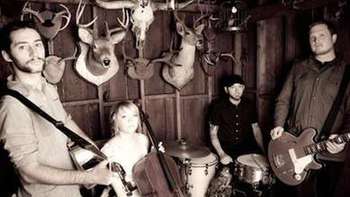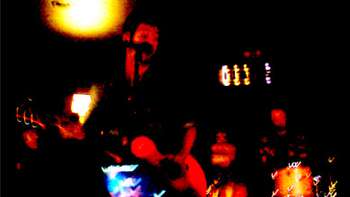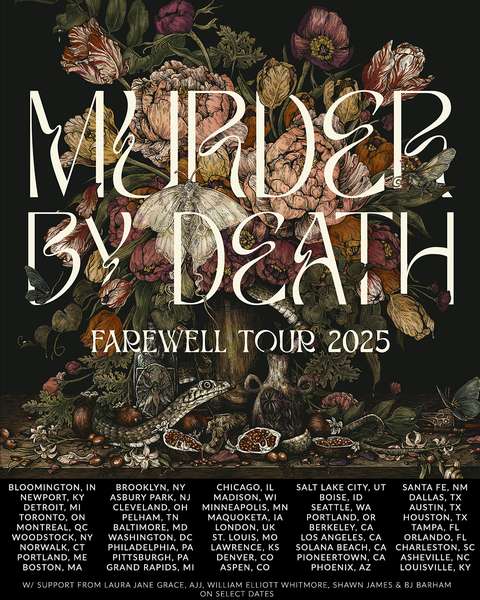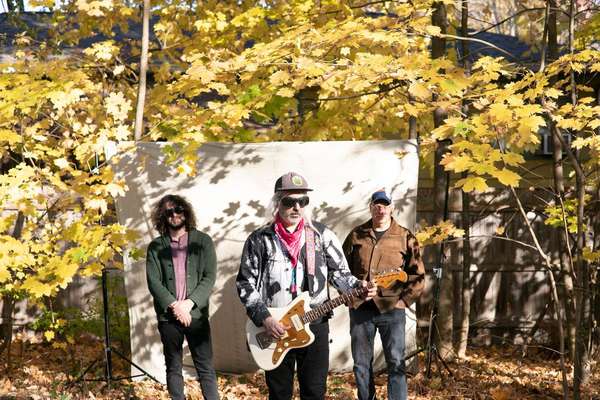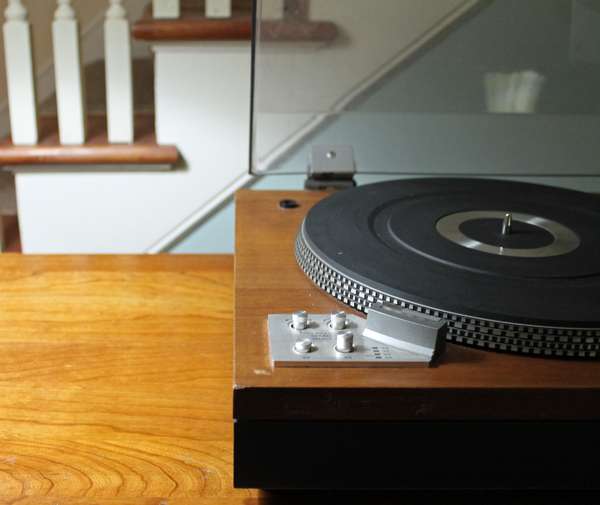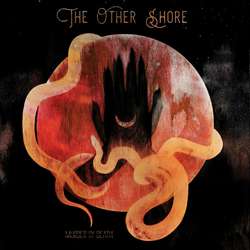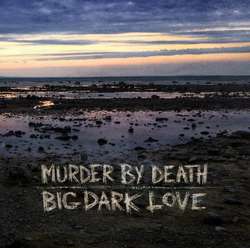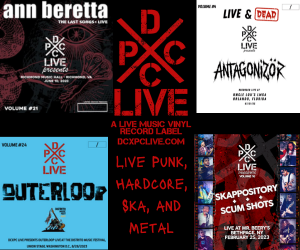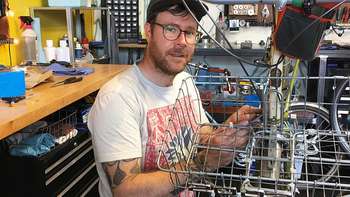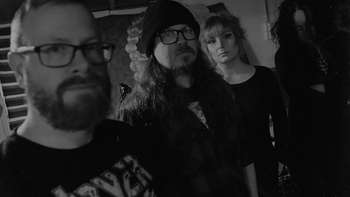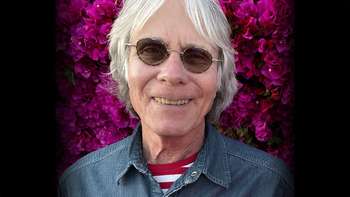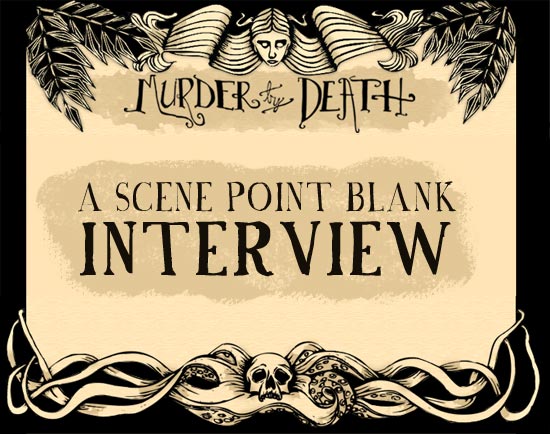
While many artists write songs, Murder by Death vocalist and guitarist Adam Turla takes a more literary approach, writing narratives that tell detailed stories as opposed to songs. Turla's unique writing approach has allowed the Bloomington, IN outfit to defy genre-defining limitations and gives the band one of the most unique sounds in modern music. Scene Point Blank caught up with the vocalist at one of the band's recent performances to discuss the band's current happenings.
Scene Point Blank: Tonight is the final night of your month-long headlining tour. Are there high expectations for this night?
Adam Turla: I think that there is always a sense that you've got to make something? the last show is one of the better performances because everybody, they're not saving anything. Plus there is a comradely on a good tour. We've been friends with William Elliott Whitmore for a long time, so we know we're going to see each other soon, but also a farewell. The other act, J. Roddy Walston and the Business, we had not had the pleasure of touring with before, so we're going to miss those dudes. Tonight, we decided we're going to have different guys come up and play songs with us and just have fun.
Scene Point Blank: How much input did you have into whom you would be touring with for this headlining run?
Adam Turla: We pick the bands?
[Bartender comes over to inquire of drinks and interjects about bands playing tonight]
Adam Turla: But I think its going to be a particularly fun show tonight, we love to play the Grog Shop and the mood of the show is going to be great; so it would be a good finale.
Scene Point Blank: I saw you guys here on the Braid tour and that was a great show, then again in Pittsburgh when you opened for Lucero?
Adam Turla: Your question before?I forgot to answer?We pick the bands, we're not big enough to get whoever we want. We often don't get the bands we want but end up with bands we'd never would have heard of because someone else recommend them, and that's how we get O' Death on the last tour. And we ended up becoming really close with those guys and it was a great tour. So sometimes you get pleasantly surprised.
Scene Point Blank: You recently released the first in a series of split 7" releases. For this one you and William Elliot Whitmore each cover one of each other's songs. How did the idea of this series first come up?
Adam Turla: The idea was that we had been touring with William Elliot Whitmore for years and he would always say how he likes our band and we've always been really big fans of him. He's a great songwriter. We thought it would be kind of a cool, something fun to do. Then we started the production of it, and we though it was really interesting and we said, "Why don't we just do a series of this?" So we did. We own all the vinyl rights by ourselves, so we just sell them at shows, put them on our website. I mail them out. It's really simple and very DIY and we only make a 1000 of them. O' Death is doing the next one and Amanda Palmer of the Dresden Dolls is doing the third one. And we're going to try to find some real diversity in the series. William's cover is just him and a banjo and O' Death is a full crazy band, and Amanda Palmer is a female vocalist. It's going to be some cool diversity. I'd like to branch out a lot. It's a small project so we're trying to keep it among people that we know, kind of like to celebrate the friendships we've created over the years.
Scene Point Blank: How did you choose which song of William's that you would cover?
Adam Turla: We thought there were two approaches. One was, we could pick a song of his that we did not think was produced very well. You could pick a song where they should have stripped the song down or built this up more. Like the song is a good song but didn't seem finished. That's one method, but he has such an extraordinary voice that I was concerned that I would not be as good. So we picked a song that it made sense for me to sing, and we picked a song that we heard a cello part. Sarah played the melody, I was on the banjo, and we turned it into a samba just because our drummer, as a joke, started playing a samba beat and we started playing the song as a samba and we got half way through it and we thought it sounds great. I really like how it turned out.
Scene Point Blank: Did you guys record the song all on your own?
Adam Turla: We recorded with a guy that we have in Indiana that we record with for a lot of demos. He's going to do all the recordings for the series.
Scene Point Blank: For Red of Tooth and Claw the band went from working with J. Robbins - who works with mostly punk and hardcore bands - to Trina Shoemaker who's worked with mainstream pop/rock artists like Sheryl Crow and Dixie Chicks. Why the decision to go in that direction?
Adam Turla: Well, the same woman manages them both. And we got drunk with her, the manager, in Texas once and when it came time to find a producer for In Bocca Al Lupo we called her for her recommendation. We ended going with J., also because we were on tour with Against Me!, and we really liked how the un-mastered version of their album sounded. And that was great; he was awesome. And with Trina, what we liked about her was her diversity. She had done country. She had done Queens of the Stone Age. She had done Iggy Pop. All sorts of variety. She has the ability to work with all kinds of bands and we felt that would be useful. And it was the best experience I had recording a record. She was amazing. She made us so comfortable that we just went in there and did two or three takes and that was it. Basically, just overdubbed the cello and the vocals. There was almost no extra guitar on the record, only for a couple of songs where it was specifically more for the feeling. Most of it was raw. She just made us sound like we worked hard. We practiced a ton before we went tin the studio, we made sure we were well rehearsed and I think that was invaluable.
Scene Point Blank: I found your working with J. on In Bocca Al Lupo to be interesting to hear his take on your sound.
Adam Turla: Yeah, and we ultimately did the work on that album, he called it co-production. We went in there with exact ideas of what we wanted and J. was awesome at realizing it. We don't know how to record stuff; we just know how we want it to sound like. I know that we were somewhat insane about how we wanted certain things to sound, but he had a really good attitude about it. We still talk to him all the time; he came out and saw us two weeks ago.
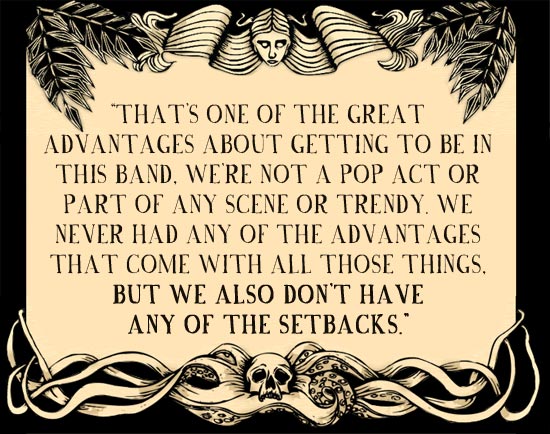
Scene Point Blank: Will the 7" series ever be compiled for CD or digital release or will it a stay a vinyl-only release?
Adam Turla: I'd like to, not sure about a CD, but what we'll probably end up doing is a 12" or a double 12" with them all. Maybe do a really small pressing, like 200 in a box ? make a cool box - to do a limited press, or maybe we'll release them digitally as well. It's all about vinyl, so maybe we'll do a CD but then again the point is to do something creative. I don't want to have to deal with getting a label because it's a cover series. I just want it to be what it is, a creative project because that's what it is. I hope that all the bands involved will get new fans out of this. I think there is something cool about validating another band by covering their songs. I'm honored that William Elliott Whitmore covered one of our songs. Hopefully some of those fans will say, "That band did a really good cover."
Scene Point Blank: Musically speaking Murder by Death fulfills a wide array of music influences into its form - everything from indie and punk to folk, country, and even music inspired from soundtracks. Do you ever find it difficult to take all these different influences and bring them into the Murder by Death sound while writing?
Adam Turla: In terms of balance, we usually just kind of do whatever we want do. That's one of the great advantages about getting to be in this band, we're not a pop act or part of any scene or trendy. We never had any of the advantages that come with all those things, but we also don't have any of the setbacks. We really just do whatever we want. Like with this 7" series. We own the vinyl rights, so we choose the bands, we choose when they come out, we do the art. It's just fun. We try to do everything when it comes to making music, I usually just start writing a song, the guys come in and build on it. What we do is? I write the lyrics first and we try to set the music to match the words. That is a major part of our songwriting style, making sure that its not just a set works layered over an incidental piece of music. And we really try to do that. The risk you run doing that is occasional making really dramatic music which some people that is what they like about it, some people it turns off because it does have a theatrical approach. Luckily people have been cool enough to indulge our tastes by coming out and buying our vinyl and CD's. I think its pleasantly pure, there is no factor other than us trying to be heard. So you can't argue with that; we kind of got it made in that regard.
Scene Point Blank: "Theme (for Ennio Morricone)" - Obviously this is written as homage to the Italian composer. What inspired you to include this piece on the album?
Adam Turla: It's funny because I started seeing his name appear in our reviews before I really knew who he was. I knew those movies and I loved those movies, but I never really put it all together. So I was writing a guitar part, and I thought to myself that it sounded like something that Ennio would have written, with the melody. That's when I thought that it would a cool idea to do a tribute to him: a rock band doing a tribute to a classical composer. What I liked about him, he was an Italian man writing music for a western world. My mother is Italian; people often say that our music sounds western. And I thought that was funny that there was a link there. It was really fun to record because it was different from all the other songs on the record; the idea was to write a sweeping theme and I'd love to have it appear in a film or something.
Scene Point Blank: I read in another interview that you have shown an interest in writing music for film and television.
Adam Turla: We very much want to. One of our songs, "Coming Home," was just played in the show "Sons of Anarchy." I'm a really big fan of Ron Perlman; I think he's a badass and a great actor. He's in a bunch of my favorite movies. I'm really excited about that. And then, they're going to use another one in another episode. And we got another show that is looking to use some of our stuff, so that's really exciting.
Scene Point Blank: Did you know about the songs?
Adam Turla: About three or four months ago we were told that they were interested in the songs. I saw the names of the actors involved and the plot idea and I was stoked. Biker gangs? All right, go for it. A week before the show, we found out they were going to do it and I was very happy about it. When this band started, doing something like that was considered selling out. That was still a term that was relevant. Now, everyone burns CD's and everyone uses music in TV shows and everywhere else. Bands are made by being in Apple commercials. That makes a band go from nothing to huge. They have more power than any label. It's insane. It's cool that we're not getting any shit for it. I don't want to feel bad for doing something that I want to do. It's not like we're getting paid a ton of money for it.
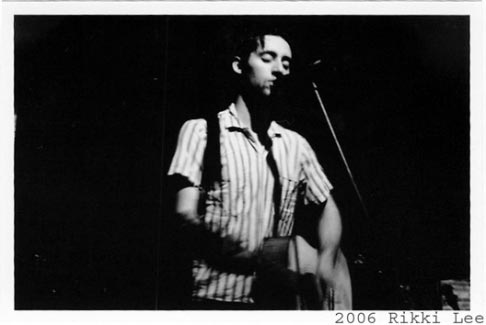
Scene Point Blank: Have you seen the show yet?
Adam Turla: No. We're going home tomorrow, my folks live in Detroit, and my dad said he Tivo'd it.
Scene Point Blank: It's a good series, FX has always done good stuff like The Shield.
Adam Turla: It's the same producer.
Scene Point Blank: Yep. I was just watching the show and then the song came on?
Adam Turla: I had my friends calling me, "Did you know about this?" It was cool. But I got a synopsis of the scene for when they're going to use "Rum Brave" and it's during a fight scene and some dude gets punched right in the face.
Scene Point Blank: That's something to brag about - haha.
Scene Point Blank: Have you ever written a song that you've felt just didn't fit with what Murder by Death was aiming for musically? If so, how did you handle it?
Adam Turla: We often write songs that don't fit in. But we allow songs to go onto the album specifically because they don't fit. That was kind of the direction that we took with In Bocca Al Lupo, songs about different people and therefore they all sounded different. That was the approach we tried to go with. Recently, I've written two or three songs that I don't necessarily feel would fit for Murder by Death and I plan on going to record them for myself, just for fun. I'm not going solo or anything. But sometimes a song pops up and you say maybe this isn't perfect, but it might just sound better stripped down. "Shiola" is the first and only song that made any of our albums that is just me. And it fits the album so well. Everyone I played it for in the band loved it; the band was very supportive and said just let it be you. So that's how it is. I didn't want to be that guy that goes and does his own thing. It's a good song and it doesn't need any more instruments, so let it be. Our rhythm section loves that song because they get to go drink beer while I play that song. In a three and a half minute song, they both shotgun two beers and are back on stage to play. They love it.
Scene Point Blank: That song is really interesting, I've had it playing in the car when I am spending time with my parents and the enjoy it. You are one of those artists that bridges generation gap, ya know?
Adam Turla: We've been getting lots of older fans at shows. We have more people in their fifties and sixties showing up at each show. That is something that I've always wanted to have, diversity of fans. I like to think that we're doing something that is different and that appeals to people of all tastes, not just white college kids.
Scene Point Blank: But sometimes that's just the way things go.
Adam Turla: Yeah, the majority of our fanbase is twenty-five to thirty-five year olds that like rock and roll.
Scene Point Blank: Literature also plays a major role in the Murder by Death sound. Is there a particular reasoning behind these lyrical incorporations and references in song/album titles and the lyrics?
Adam Turla: A lot. I like to link all the songs on an album together, some people call that a concept record, I don't think it's not a concept record, I just don't think about it that way. When I think about writing a record, I think of it as writing a book and each song is a chapter, like a series of short stories. I don't listen to much music anymore, since I've been in a band I just prefer silence. I watch a lot of films and read a lot of books. I was never really able to write just normal songs like "Oh I need you babe." When I try to, it just ends up being funny?
[Editor's Note: At this point the tape recorder decided to continue taping over the same location on the tape leaving a jumped mess of noise, so the remainder of our conversation was lost. Repeated attempts to salvage the conversation proved to be in vain.]
Words: Michael | Graphics: Matt
- Murder By Death Website: http://www.murderbydeath.com

